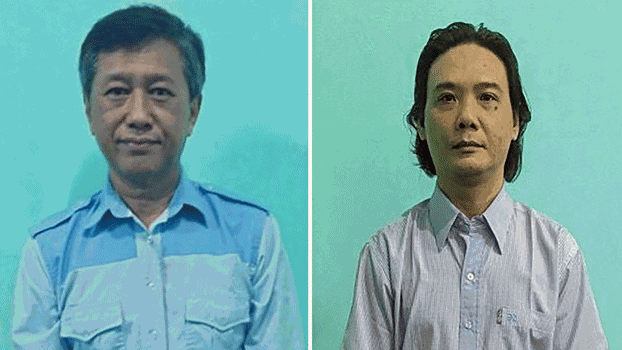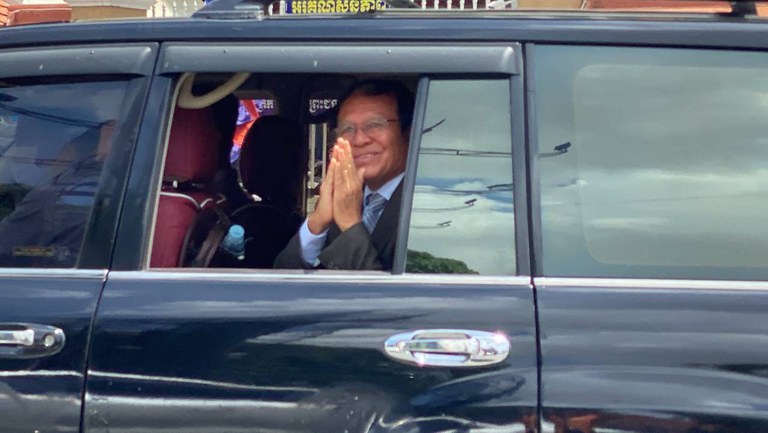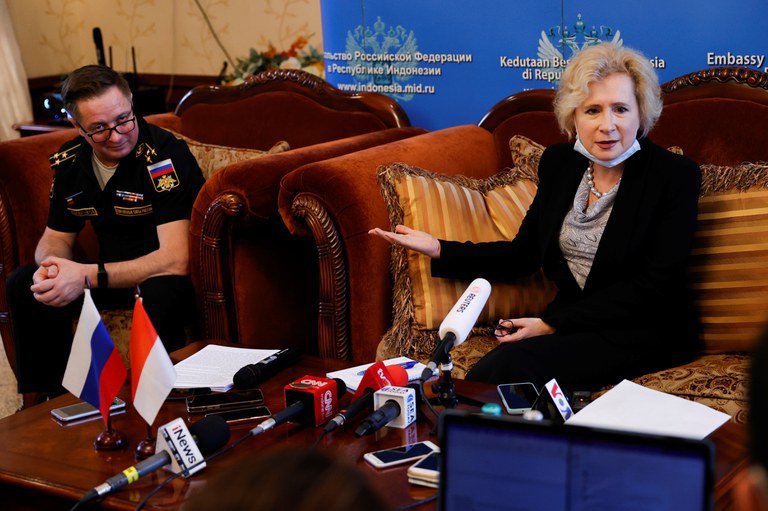The split between Cambodian opposition leaders Kem Sokha and Sam Rainsy could help Prime Minister Hun Sen and his ruling Cambodian People’s Party (CPP) hold power, sources in the country told RFA. Kem Sokha, while on trial Wednesday on unsubstantiated charges of treason, declared that his alliance with his Cambodia National Rescue Party (CNRP) co-founder Sam Rainsy was over, seemingly confirming rumors that the country’s top opposition partnership of the past decade had ended. Sam Rainsy, who has been living in self-imposed exile in France since 2015, attributed Kem Sokha’s statement to the legal pressure he faces and said that there was no change in their relationship. Such a split, if genuine, could help the CPP in general elections next year, and all but ensure a smooth transition of power from Hun Sen to his son, Han Manet, exiled political analyst Kim Sok told RFA’s Khmer Service. Hun Sen has ruled the country since 1985. “Hun Sen will transfer power to his son because he has seen sign of split between the opposition leaders,” he said. Mey Chandara, coordinator for the Phnom Penh-based Cambodia Youth Network, told RFA that the split will cause a rift in supporters of the opposition at a time when they should be unified to challenge the ruling party. “We don’t want to see them separate. We want the opposition’s voices to demand justice in the upcoming election,” he said. Sam Rainsy founded the Candlelight Party under a different name in 1995. In 2012, supporters from his party and Kem Sokha’s Human Rights party merged to form the CNRP, which was dissolved by Cambodia’s Supreme Court five years later after it performed well in the country’s 2017 communal elections. Candlelight, as a separate party from the CNRP, was technically not affected by the ban and has risen to become the largest opposition party in the country. Sam Rainsy has thrown his support behind Candlelight, whereas Kem Sokha believes that its participation in what he viewed as a compromised election earlier this month only serves the CPP and its claims of winning the elections in a landslide. Seng Sary, a political analyst, said the divide between the two opposition leaders was real, and not initiated for strategic purposes. He said that the split was initiated by Kem Sokha, who did not support the opposition Candlelight Party in this year’s local commune elections. CPP spokesman Chhim Phalvorun dismissed the idea that the CPP would benefit from the split between Sam Rainsy and Kem Sokha. CPP will stay in power because it has the support of the people, he said. “When a wife and husband get a divorce, it is their issue. It has nothing to do with outsiders,” he said. If the rift in the opposition can be described as a divorce, it is not an amicable one, at least as far as Kem Sokha’s daughter, Kem Monovithya, is concerned. She wrote scathing criticism of Sam Rainsy on her Facebook account, accusing him of allowing Hun Sen and the CCP to use him to attack her father. “We think the ruling party wants to destroy the opposition party as a whole, especially the [Cambodia] National Rescue Party,” she wrote. “[The CPP] is doing two things. It is destroying Sam Rainsy through threats to arrest him, so he fled. At the same time, it is destroying Kem Sokha by using Sam Rainsy’s hands to attack him because he hasn’t fled,” Kem Monovithya wrote. “We think the ruling party and Sam Rainsy’s faction think that if Kem Sokha dares to defend himself or express any different ideas [from Sam Rainsy’s], his popularity will decline,” she said. Kem Sokha is now more popular than when he started the Human Rights Party in 2007, Kem Monovithya added. “Kem Sokha has been the main leader since 2007, so we will continue our courage and speak the truth, even if the truth hurts Sam Rainsy’s faction or the ruling party,” she said. “In simple language, we will fight both.” Activist yet to meet lawyer Cambodian American activist Theary Seng, who on Tuesday was arrested while she protested a mass trial that convicted her and more than 50 other democracy advocates for their associations with the CNRP, has still not been allowed to meet with her lawyer in prison. By forbidding him to meet with his client, the lawyer, Choung Choy Ngy, told RFA that Phnom Penh’s Prey Sar Prison was breaking Cambodian law, which specify that prisoners be allowed to meet with legal counsel to discuss appeals. He said he was preparing a complaint to the Ministry of Interior, seeking intervention from Minister Sar Keng to allow him to meet Theary Seng. “Theary Seng wasn’t at the announcement of the court verdict, so she doesn’t [officially] know what the verdict is, so my intention was to inform her and explain her rights to appeal,” Choung Choy Ngy said. “I am sad that prison officials didn’t allow me to meet her.” Prison Department spokesman Nuth Savna told RFA that officials have designated her as a special case, so they have worked to ensure her safety, so for the time being the prison will not allow visitors. “We didn’t allow the visit due to safety and security factors,” he said, adding that prison officials received information that there is a plan by Theary Seng supporters to protest in front of the prison. The prison should allow her to meet with her lawyer, otherwise it is a violation of Theary Seng’s rights, Am Sam Ath of the Cambodian League for the Promotion and Defense of Human Rights told RFA. The U.S. State Department said it was “deeply concerned” about Tuesday’s verdict in a statement published Wednesday evening. “The sentencing of these opposition activists, many of whom are associated with the disbanded Cambodia National Rescue Party, is the latest instance in an alarming pattern of threats, intimidation, and persecution of opposition political leaders and parties. These actions undermine multiparty democracy and the rule of law,” department…




